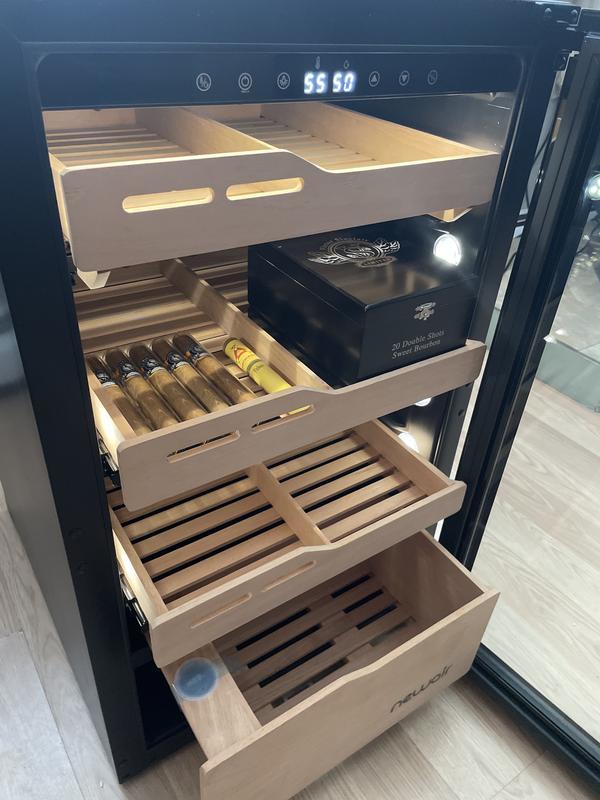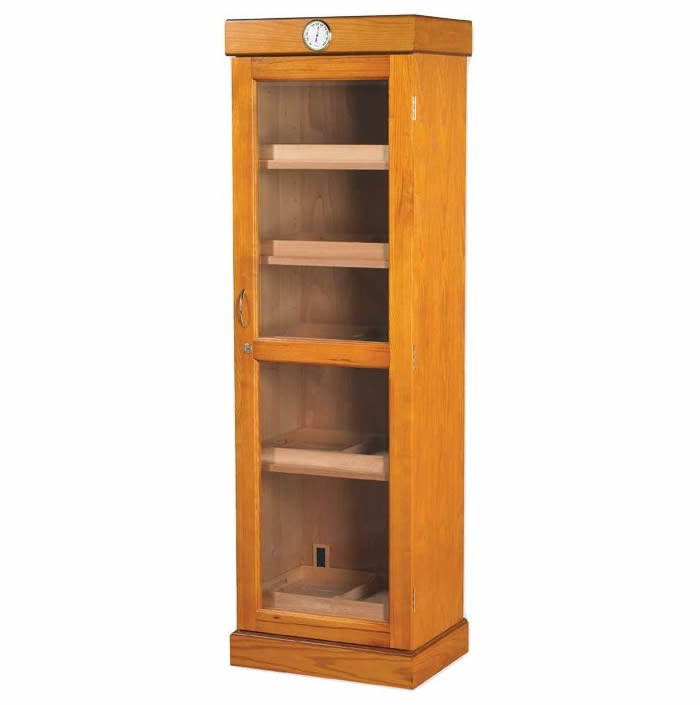Before diving into the comparison of electric and wooden humidors, it's essential to understand what a humidor is and its key functions. A humidor is a specialized container designed to store and age cigars by maintaining the ideal humidity and temperature. The goal is to preserve the cigars' freshness, prevent them from drying out or becoming too moist, and ensure they maintain their flavor profiles over time.

Wooden humidors, typically made from Spanish cedar, are valued for their natural humidity regulation and their ability to impart a mild cedar aroma to cigars. Their porous material absorbs and releases moisture, helping to stabilize the environment inside. In contrast, electric humidors use advanced technology to offer precise humidity and temperature control. These humidors often feature automated systems that provide consistent conditions with minimal effort. Some models even allow for remote monitoring and control, making them a convenient option for those who prefer a hands-off approach to cigar storage.
Both types of humidors have their advantages and drawbacks, which we'll explore in more detail. Whether you prioritize tradition or convenience, the choice between an electric or wooden humidor depends on your personal preferences and how you wish to maintain your cigar collection

Electric Humidors:
Electric humidors have transformed cigar storage by providing an automated, reliable way to maintain the ideal environment for cigar preservation and aging. These devices are equipped with advanced technology that allows users to control humidity and temperature with high precision, often through digital interfaces or remote monitoring systems. Unlike traditional wooden humidors, which rely on natural materials to manage humidity, electric humidors excel in providing consistent conditions regardless of external environmental changes.
One of the biggest advantages of electric humidors is their accuracy. With built-in hygrometers, fans for air circulation, and automated humidity control, they ensure that cigars are stored in a stable environment without requiring much manual adjustment. This makes them especially appealing for large collections or climates where maintaining constant humidity is challenging. Additionally, many models come with added features such as LED lighting, multiple storage compartments, and app-controlled systems for real-time monitoring.
However, electric humidors do have some downsides. They are typically more expensive than wooden humidors and require a power source, which may limit where they can be placed. There's also the risk of mechanical failure, which could disrupt the delicate balance needed for cigar preservation. While they offer convenience and precision, some cigar enthusiasts prefer the more traditional feel of a wooden humidor and the subtle aroma it imparts to cigars.
The Pros of Electric Humidors
Precise Humidity Control
One of the standout features of electric humidors is their ability to maintain precise humidity levels. The built-in sensors and controls allow users to set and monitor humidity with unmatched accuracy, ensuring cigars are preserved in an optimal environment.
Low Maintenance
Electric humidors often require minimal maintenance compared to traditional humidors. The automated systems manage the humidity regulation, reducing the need for constant manual adjustments. This feature appeals to users seeking a hassle-free cigar storage solution.

Even Air Circulation
Adequate air circulation is crucial for consistent humidity distribution. Electric humidors are designed with built-in fans or ventilation systems, promoting even airflow to every corner of the humidor. This ensures that each cigar receives the same level of care, contributing to uniform aging.
Remote Monitoring and Control
Many electric humidors come equipped with remote monitoring and control features. Users can check and adjust humidity levels from a distance, providing convenience and peace of mind, especially for those who travel frequently.
Read our Remington Lite Electric Humidor Cabinet Review 2024
The Cons of Electric Humidors
Initial Cost
One of the primary drawbacks of electric humidors is the initial cost. Compared to traditional humidors, electric models can be pricier due to their advanced features & technology. This cost factor may be a deterrent for budget-conscious cigar enthusiasts.
Dependence on Power
Electric humidors are reliant on a continuous power source to function effectively. In the event of a power outage, there is a risk of cigars being exposed to fluctuating humidity levels, potentially impacting their quality. This dependence on power is a critical consideration for users in areas prone to electricity disruptions.
Limited Aesthetic Options
While electric humidors offer advanced functionality, they may lack the traditional aesthetic appeal of wooden humidors. For aficionados who appreciate a traditional humidor's classic look and feel, the modern appearance of electric models may not align with their preferences.
When considering the advantages and disadvantages of electric humidors, it's clear that these innovative storage solutions offer unparalleled control and convenience. However, users must carefully consider factors such as cost, power dependence, and aesthetic preferences before making a choice. Ultimately, the decision to purchase an electric humidor depends on individual preferences, lifestyle, and priorities in cigar storage.
Wooden Humidors:
Wooden humidors have long been revered as the traditional and classic choice for storing cigars, offering a combination of craftsmanship and functionality. Let’s dig in to meticulously examine the advantages and disadvantages of using wooden humidors, shedding light on their unique features and considerations for cigar enthusiasts.
The Pros of Wooden Humidors
Natural Humidity Regulation
Wooden humidors, typically crafted from Spanish cedar, possess natural moisture-absorbing properties. This feature contributes to the regulation of humidity levels within the humidor, creating an environment conducive to the slow and consistent aging of cigars.
Enhanced Flavor Profile
Spanish cedar, a common wood used in wooden humidors, imparts a subtle and pleasant aroma to stored cigars. This enhances the overall flavor profile, adding nuanced notes that aficionados often appreciate. The wood's ability to mellow and complement the cigars over time is a distinct advantage of wooden humidors.

Aesthetic Appeal and Craftsmanship
Wooden humidors are celebrated for their timeless aesthetic appeal and craftsmanship. They come in various finishes, from classic mahogany to exotic woods, offering a wide range of options to suit individual tastes. The artistry and attention to detail in the construction of wooden humidors contribute to their allure as both functional and decorative pieces.
Versatility in Sizes and Styles
Wooden humidors are available in a diverse array of sizes and styles, catering to the preferences and needs of different cigar enthusiasts. Whether it's a small desktop humidor or an expansive cabinet-style model, wooden humidors provide versatility in storage options.
Long-Term Investment:
Wooden humidors, often crafted with precision and attention to detail, represent not just a functional storage solution for cigars but a lasting investment in quality. Their construction from materials like Spanish cedar, known for its durability, ensures that these humidors can withstand the test of time. With proper care and maintenance, wooden humidors not only maintain their structural integrity but also develop a unique character, bearing the marks of years of use. The investment in a high-quality wooden humidor transcends generations, becoming a treasured family heirloom. The craftsmanship and timeless design make these humidors more than just storage containers; they become a symbol of tradition and appreciation for the finer things in life. The enduring value and sentimental significance attached to a well-maintained wooden humidor make it a legacy piece these humidors have the potential to last a lifetime, becoming treasured family heirlooms, carrying with it the stories and memories of its use.
Retention of Cigar Oils:
Wooden humidors have the unique ability to retain essential oils released by cigars during the aging process. The porous nature of Spanish cedar, commonly used in wooden humidors, allows the wood to absorb and redistribute these flavorful oils. Over time, this interaction between the wood and the cigars results in a harmonious marriage of tastes. The retained oils not only contribute to the overall flavor consistency of the stored cigars but also add layers of complexity to the smoking experience. As the cigars age within the humidor, the wood imparts subtle nuances, enhancing the richness and depth of the tobacco flavors. This unique interaction provides aficionados with a more profound and nuanced smoking experience, elevating the enjoyment of each cigar. The retention of cigar oils is not just a functional aspect but a testament to the symbiotic relationship between the humidor and the cigars, creating a palate-pleasing journey for those who appreciate the art of cigar aging.
Read this: 10 BEST SMALL HUMIDORS TODAY
The Cons of Wooden Humidors
Seasonal Maintenance
Wooden humidors may require more attention to maintenance, particularly during seasonal changes. The porous nature of the wood can be influenced by external factors, leading to fluctuations in humidity levels. Regular monitoring and adjustments may be necessary to counteract these effects.
Initial Cost and Quality
Quality wooden humidors can be a significant investment, and while they offer numerous benefits, the initial cost may be a deterrent for some enthusiasts. Ensuring the purchase of a well-constructed and high-quality humidor is essential to avoid potential sealing and humidity control issues.
Limited Technological Features
Unlike electric humidors, wooden humidors may lack advanced technological features such as remote monitoring or precise humidity controls. For those seeking a more automated and high-tech solution, the simplicity of a wooden humidor may be considered a drawback.
In the realm of cigar storage, wooden humidors continue to hold a place of prominence due to their classic charm, natural humidity regulation, craftsmanship, longevity, and the ability to enhance the overall flavor profile of cigars. While considerations such as maintenance and cost should not be overlooked, the choice between wooden and alternative humidors ultimately hinges on individual preferences, appreciation for tradition, and the desired aesthetic for showcasing and preserving a valued cigar collection.
The Bottom line: Which one is the Best, Electric Humidor or Wooden Humidor?
The choice between an electric humidor and a wooden humidor ultimately depends on individual preferences, lifestyle, and priorities in cigar storage. Each type has distinct advantages and considerations, and the "best" option varies based on the user's specific needs and preferences.
For those who value precise humidity control, low maintenance, and advanced technological features, an electric humidor may be the preferred choice. Electric humidors excel in providing accurate humidity regulation, even air circulation, and additional conveniences such as remote monitoring.
On the other hand, if one appreciates a humidor's traditional charm, craftsmanship, and aesthetic appeal, along with the natural humidity regulation provided by materials like Spanish cedar, a wooden humidor might be the ideal selection. Wooden humidors offer versatility in sizes and styles, contribute to the enhanced flavor profile of cigars, and are often viewed as long-term investments.
Ultimately, there is no definitive answer to whether electric or wooden humidors are better; it's a matter of personal preference. Some enthusiasts may prefer the modern convenience of an electric humidor. In contrast, others may find the classic elegance of a wooden humidor more appealing. Ultimately, the best choice is the one that aligns with an individual's lifestyle, taste, and priorities in preserving and enjoying their cigar collection.
Frequently Asked Question
-
What are the main advantages of electric humidors?
- Electric humidors offer precise humidity and temperature control, often with digital settings, which is particularly helpful in environments with fluctuating climate conditions. They also require less manual maintenance and are ideal for long-term storage of large cigar collections.
-
What are the key benefits of wooden humidors?
- Wooden humidors, especially those lined with Spanish cedar, enhance the flavor and aroma of cigars and provide a traditional, aesthetic appeal. Cedar absorbs and releases humidity naturally, creating a stable environment for cigars and imparting a pleasant aroma to enhance the aging process.
-
Are electric humidors more expensive to operate than wooden humidors?
- Yes, electric humidors generally cost more upfront and may slightly increase electricity bills, particularly if they use a cooling or heating element. Wooden humidors, in contrast, rely on passive humidity control, requiring only a humidifier, making them more cost-effective to operate.
-
Which type of humidor is easier to maintain?
- Electric humidors are typically easier to maintain since they often have built-in humidity and temperature controls. Wooden humidors require more frequent checks on humidity levels, refilling the humidifier, and periodic cleaning, making them a bit more hands-on.
-
Do electric humidors hold humidity levels better than wooden humidors?
- Yes, electric humidors usually maintain more stable humidity levels since they can actively adjust based on internal sensors. Wooden humidors depend on passive humidifiers, so they may experience slight humidity fluctuations, especially in changing climates.
-
Which type of humidor is better for beginners?
- Wooden humidors are often better for beginners due to their lower cost, traditional charm, and simplicity. Electric humidors, with advanced features, may be more suitable for enthusiasts who want precise control and are willing to invest more in their cigar storage.


